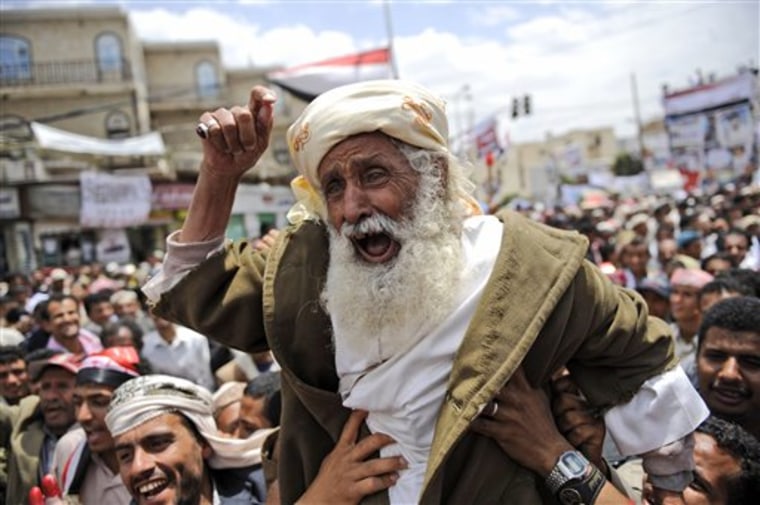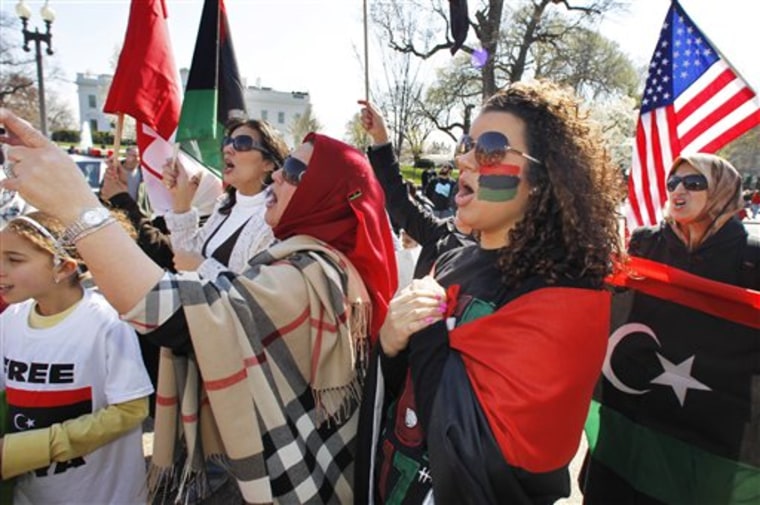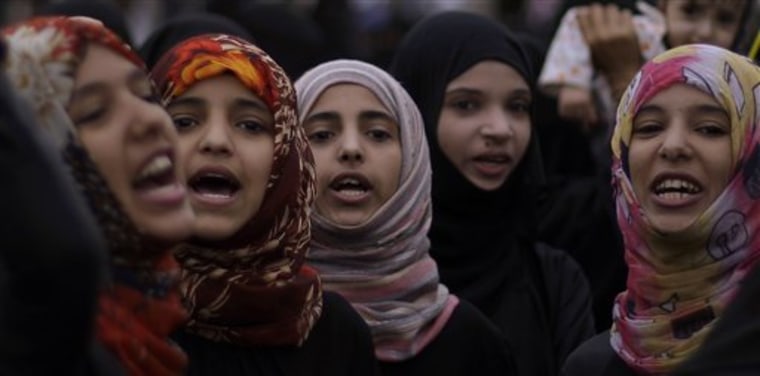A look at the latest developments in Mideast political unrest on Saturday:
Yemen: Talks hit snag; al-Qaida moves in
Allies of Yemen's president and his political opponents failed to make progress Saturday in talks on a possible exit for the man who has led the nation through 32 years of growing poverty and conflict and whose rule is now deeply imperiled by a popular uprising.
As the political turmoil deepened, there were signs that Islamic militants in the remote reaches of the country were seeking to make gains on the situation. Residents and witnesses in the small town of Jaar in the south said suspected al-Qaida militants moved down from an expanse of mountains on Saturday to seize control there a few weeks after police fled, setting up checkpoints and occupying vacant government buildings.
President Ali Abdullah Saleh argued in a TV interview that without him, the country would be at grave risk of breaking apart.
"Yemen is a ticking bomb and if the political system collapses and there's no constructive dialogue there will be a long civil war that will be difficult to end," he told the Al-Arabiya network.

Officials on both sides of Saturday's talks, which were attended by the U.S. ambassador, said the parties refused to give any ground. After six weeks of unprecedented protests in Yemen, Saleh says he is willing to step aside, but has left himself room for maneuver by adding the condition that he wants to leave the country in "safe hands."
The protesters — whose ranks have been bolstered by defecting military commanders, lawmakers, Cabinet ministers, diplomats and even Saleh's own tribe — are insisting he go immediately. The demands and defections have only grown since government security forces — including snipers on rooftops — shot dead more than 40 demonstrators in the capital of Sanaa a week ago.
Jordan: King's supporters take to street
Thousands of supporters of Jordan's King Abdullah II took to the streets of the capital Saturday to express their loyalty, as a resilient opposition protest movement demands political reforms and new elections.
The 7,000 people sought to put on a display that would counterbalance scenes a day earlier when security forces and government supporters clashed with thousands of anti-government protesters.
One person died in Friday's protests, and the government insisted he was one of its supporters and that he died of a heart attack. But Khairi Saad's brother said Saturday that he was among the anti-government protesters, and an Islamic opposition groups said he was beaten to death by police. He was the first person to die during nearly three months of unrest.
Jordan's protests have generally been smaller than those in other Arab nations — and in another difference have not sought the ouster of the country's leader, Abdullah.
But the young Jordanians organizing the demonstrations said this week they are intensifying their campaign, demanding the removal of the prime minister, creation of a more reformist government, the dissolving of what is seen as a docile parliament and the dismantling of the largely feared intelligence department.
Abdullah's supporters waved the king's portrait and danced in Saturday's march, chanting, "With our lives and souls, we sacrifice for you, our king."
Egypt: Prime minister vows corruption fight
Egypt's Prime Minister Essam Sharaf vowed Saturday to press a fight against corruption, responding to public pressure to speed up investigations into alleged graft by allies of ousted President Hosni Mubarak.
He also defended a draft law banning strikes, denying criticism from human rights groups that it curtails freedom of expression and the right to protest.
Prosecutors have been investigating graft allegations against former officials and businessmen after an uprising toppled Mubarak last month, but many Egyptians protest that several of the former leader's allies have yet to be arrested.
"The government has not and will not cover up corruption regardless of its nature or identity. We will stamp it out no matter where it is. That is a vow from the government to the people of this nation," Sharaf said in a televised statement.
"There is no place for those who were the enemies of the January 25 revolution in this new era," he said.
The cabinet was formed by Egypt's interim military rulers to try to meet protesters' demands for the removal of officials linked to Mubarak.
Sharaf said the cabinet had been successful in its first three weeks. It had overseen the first free and fair vote, redeployed police forces, dissolved Egypt's state security apparatus and started trading in the stock exchange, he said.
But human rights groups have criticized it for approving a draft law, valid as long as Egypt's state of emergency is in force, that bans strikes for damaging the economy. It extends to those who organize strikes.
Washington: Variety of protesters at White House
The pedestrian-only strip of Pennsylvania Avenue, between the White House and Lafayette Square, often hosts demonstrators. Rarely, however, do so many interests bump into each other, literally, and generate such a cacophony of unrelated chants.
Under cool, sunny skies, the eastern-most circle comprised people demanding the ouster of Yemeni President Ali Abdullah Saleh. "Pray for Yemen" said a child's hand-lettered sign.
Next was a group denouncing Syrian President Bashar Assad. "Stop killing civilians," said one sign, as the group chanted slogans in Arabic.

Another circle of flag-waving people supported Bahrain's monarchy. "We love our government" one sign said.
Two women dissented nearby, displaying photos of slain protesters in Bahrain. "We met them with flowers," their poster said, "they met us with death."
The loudest group, thanks to amplifiers, protested the U.S.-led bombings of Moammar Gadhafi's forces in Libya. "Libya for Libyans, not for Wall Street dividends," they chanted.
Perhaps the largest group — more than 50 people — carried signs criticizing GMOs. Not to be confused with cars or federal agencies, GMOs are genetically modified organisms, which render some foods unsafe, the demonstrators said.
The biggest prop carried the most enigmatic message. An inflated elephant bore a sign demanding "the truth" about the September 2001 terrorist attacks, which it labeled "the elephant in the room."
Uniformed Secret Service agents, who have seen it all before, looked on calmly and seemed to enjoy the lovely blue skies.
